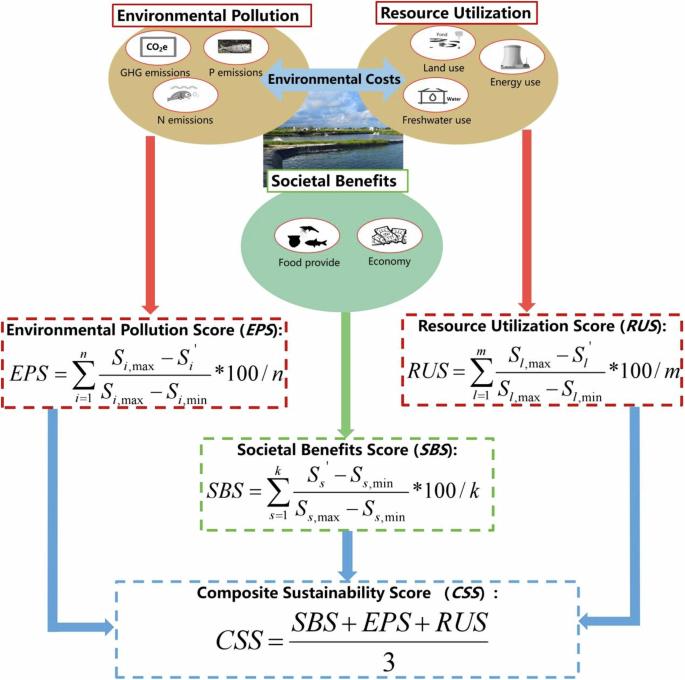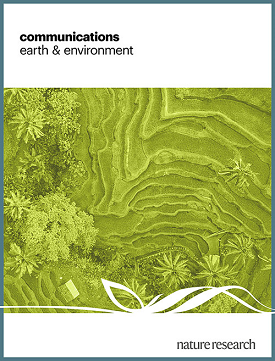全世界水产养殖业的社会效益和环境绩效需要改善
IF 8.1
1区 地球科学
Q1 ENVIRONMENTAL SCIENCES
引用次数: 0
摘要
作为人类蛋白质的重要来源,水产养殖为社会带来了利益,但同时也带来了环境成本,因此在成本和利益之间取得平衡以确保水产养殖的可持续性至关重要。在此,我们开发了一个综合可持续性指数,整合了水产养殖的社会效益和环境成本。结果显示,161 个国家中有五分之二在 2018 年达到了可持续性高分(得分 50),这表明全球水产养殖的可持续性亟待提高。亚洲国家尤其如此(平均得分 45.01 ± 11.44),而欧洲国家的表现则优于其他地区(60.15 ± 13.64)。此外,提升回归树模型显示,水产养殖可持续性的59.3%变异由8个指标支持,包括社会因素、地理影响和水产养殖结构。通过关注双壳贝类的生产和保持鱼虾类群的优化选择,可以提高全球水产养殖的可持续性。亚洲和非洲国家需要提高水产养殖的社会效益和环境绩效,而根据一项使用社会、经济和环境数据综合指数的分析,欧洲国家在整体水产养殖可持续性方面优于其他地区。本文章由计算机程序翻译,如有差异,请以英文原文为准。

Social benefits and environmental performance of aquaculture need to improve worldwide
As a crucial source of protein for humans, aquaculture provides societal benefits but also poses environmental costs making it pivotal to strike a balance between costs and benefits to ensure aquaculture sustainability. Here we developed a composite sustainability index integrating societal benefits and environmental costs of aquaculture. The results show that two-fifths of the 161 countries achieved a high sustainability score (score > 50) in 2018, indicating a considerable need for improvement in the sustainability of aquaculture worldwide. This was particularly true for Asian countries (average score 45.01 ± 11.44), while European countries outperformed other regions (60.15 ± 13.64). Moreover, a Boosted Regression Tree model revealed that 59.3% of the variance in aquaculture sustainability was supported by eight indicators, including social factors, geographical effects, and aquaculture structures. By focusing on bivalve production and maintaining an optimized choice of fishes and shrimp taxa, the sustainability of global aquaculture could be enhanced. Asian and African countries need to improve aquaculture’s social benefits and environmental performance, and European countries outperformed other regions in overall aquaculture sustainability according to an analysis that uses a composite index with social, economic, and environmental data.
求助全文
通过发布文献求助,成功后即可免费获取论文全文。
去求助
来源期刊

Communications Earth & Environment
Earth and Planetary Sciences-General Earth and Planetary Sciences
CiteScore
8.60
自引率
2.50%
发文量
269
审稿时长
26 weeks
期刊介绍:
Communications Earth & Environment is an open access journal from Nature Portfolio publishing high-quality research, reviews and commentary in all areas of the Earth, environmental and planetary sciences. Research papers published by the journal represent significant advances that bring new insight to a specialized area in Earth science, planetary science or environmental science.
Communications Earth & Environment has a 2-year impact factor of 7.9 (2022 Journal Citation Reports®). Articles published in the journal in 2022 were downloaded 1,412,858 times. Median time from submission to the first editorial decision is 8 days.
 求助内容:
求助内容: 应助结果提醒方式:
应助结果提醒方式:


